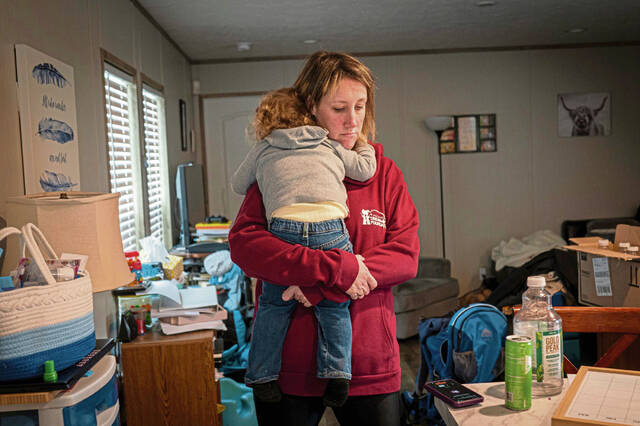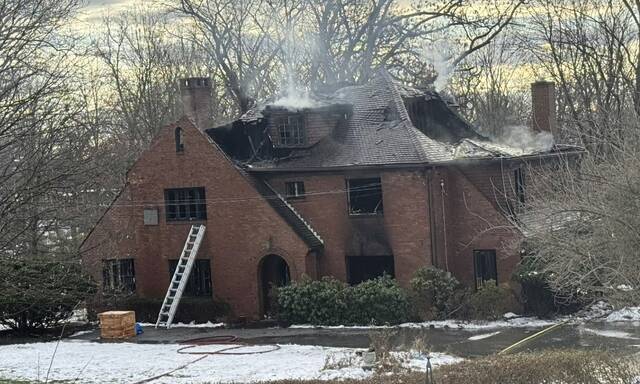Administrators and staff at five nursing homes where Harrison nurse Heather Pressdee worked either were suspicious or knew outright that she was harming patients, according to charges filed Thursday by the state Attorney General’s Office.
Pressdee, 41, was charged in connection with 17 total deaths at five nursing homes in Lower Burrell, West Deer, Kittanning, Chicora and Butler. She faces two new counts of first-degree murder and 17 counts of attempted murder for, prosecutors say, overdosing patients with insulin.
She remains in the Butler County jail without bond.
Pressdee worked at 11 local nursing facilities since 2018 despite a pattern of being fired for patient mistreatment and despite a 2022 referral by a hospital physician to the state Department of Health about his concerns that Pressdee was harming patients.
“I’m gravely concerned that many medical facilities and long-term care facilities are focusing more on profits than they are on patients,” attorney Robert Peirce III said.
His firm filed a wrongful death lawsuit Oct. 3 against Belair Healthcare and Rehabilitation Center in Lower Burrell that accuses Pressdee of killing Marianne Bower, a 68-year-old Belair resident with multiple sclerosis, by administering a lethal dose of insulin.
The suit alleges that Belair botched Pressdee’s background check and refused to heed concerns raised by Pressdee’s co-workers.
According to investigators, colleagues at several facilities raised red flags about Pressdee. She had a penchant for saying certain patients needed to die, and co-workers started to notice Pressdee’s patients were dying unexpectedly, the criminal complaint said.
“According to the latest filing by the Attorney General’s Office, while Miss Bower was a resident at Belair, there were numerous complaints by staff and concerns that nurse Pressdee was killing residents,” Peirce said.
“The fact that they did an internal investigation and determined there was not enough evidence to support those concerns is sickening.
“When she left and went to other facilities, more patients continued to die due to her improper care.”
Related
• A look at some of the victims in connection with Heather Pressdee’s murder, attempted homicide charges
• Harrison nurse Heather Pressdee linked to 15 additional nursing home deaths
• Harrison nurse charged with homicide of 2 patients worked at 11 medical facilities in the past 5 years
Calls to the state Department of Health regarding vetting of health care workers and checks and balances after nursing home deaths were not returned.
Zachary Shamberg, president and CEO of the Pennsylvania Health Care Association, a statewide advocacy group for at-risk senior citizens, said that, because Pressdee held a state license as a registered nurse, it should have prompted “fit-for-duty evaluations” and other screenings before each hiring.
“What’s alarming is that red flags from previous employers, about intentions or behaviors, weren’t able to be shared,” Shamberg said.
Pressdee’s licenses and capabilities could be accessed, but there is no registry or other system to make conduct or mannerisms known, he said.
“That is a key ingredient,” he said. “A person like this should not be able to jump from facility to facility if there is a concern about their intentions,” Shamberg said.
Providers can report behaviors that spur an investigation, but it wouldn’t prevent a person from being hired until the findings are complete.
The association is working to fix that flaw, a particular issue in today’s world where contract staffing and traveling nurses are employed, Shamberg said.
Last year, the group worked to advance legislation to provide oversight and accountability. It became law last December but has yet to be implemented.
“We need to fix this loophole,” Shamberg said. “It needs to be prioritized.”
Brett Hambright of the state Attorney General’s Office said he could not comment on whether other facilities where Pressdee worked since 2018 were being investigated or whether there is evidence of facilities failing to properly conduct background checks.
According to investigators, Pressdee provided a fake phone number and contact for job referrals in more than one instance. Police believe the person who provided the references was a relative of Pressdee’s, but Hambright would not comment on the issue.
Attorneys Phil DiLucente and James DePasquale represent Pressdee and were with her at a preliminary hearing Thursday. Pressdee did not enter a plea, DiLucente said.
DePasquale said the goal, from the beginning of the case, was to not have the death penalty imposed.
DiLucente said: “It’s a substantial number of people, and it’s a very serious case. Probably one of the most serious cases I’ve experienced in my career.”
Investigators said Pressdee admitted to harming, with the intent to kill, all patients related to Thursday’s charges.
The victims ranged in age from 43 to 104.
When Pressdee was initially charged in May with killing two nursing home patients in Butler County, she told police she hated to see the patients in pain and wanted to relieve their misery.
The newest charges paint a heinously different picture.
In cellphone messages retrieved by police, Pressdee sent multiple texts to her mother that conveyed a lust for death.
On Christmas 2022, while working at a nursing home, she wrote, “I can’t with this lady tonight. She’s going to get pillow therapy.”
Another entry read, “Well, she’s alive and she may die now.”
Another text said: “I drugged him already and I don’t know how he is awake.”
Pressdee was meticulous in making sure some of her patients did not survive, according to investigators. If a first dose of insulin didn’t kill them, she used another or created an air embolism with a syringe, according to the complaint.
On March 21, she is accused of killing a 104-year-old nondiabetic patient with a lethal dose of insulin — after Pressdee called the woman “disgusting” and asked, “When is she going to die already?”
Four days later, she gave a 90-year-old man an excess dose of insulin, and, when that “did not work,” she gave two, 10 milliliter flushes to the patient’s insulin port to cause an embolism.
Pressdee established a pattern, investigators said, of administering insulin at night when staffing was low and there was less chance for the emergencies to be noticed.
She planned for her victims to die before shift changes so they couldn’t be sent to the hospital, where her scheme might be uncovered, according to the complaint.
Pressdee told police she left a deceased 99-year-old woman in her room until another nurse found her — and then assisted while CPR was performed.
Tony Marcocci, a 43-year veteran with the Westmoreland County District Attorney’s Office, said he’s never seen anything like it in his career.
“I understand the empathy that someone may have, but that’s a little much,” Marcocci said.
“I’ve seen nurses stealing medications and then the doctors up the patient’s medication and they overdose, but I don’t recall anything like this — ‘mercy killings’ on purpose.
“She’s gonna have to live with that the rest of her life.”
Attorney Ryan Duty, who specializes in nursing home abuse with the Senior Justice Law Firm in Pittsburgh, also said the charges are beyond imagination.
“In my years of dealing with nursing homes, I’ve never seen anything approach this level. I can’t imagine what the families are going through. They’ve already buried their loved ones, thinking they died of natural causes. And then to find out they were murdered? It’s incredible.”
Duty foresees a plethora of possible lawsuits against the nursing facilities that employed Pressdee.
“Should they have known this person’s propensities? Should they have kept her on as long as they did?” Duty said. “It appears there were warning signs about this nurse, and several facilities hired her anyway.”
Chalon C. Young, a professor at the University of Pittsburgh School of Law, said Pressdee’s alleged egregious acts would vault her into the category of serial killer.
“When we think of the words serial killer, we usually think of people like (Ted) Bundy and (Jeffrey) Dahmer, who kill for personal gratification, control or excitement,” said Young, a longtime criminal trial attorney who has taught courses that involve analyzing criminal behavior.
Others believe they are morally justified, she said. Those individuals, who are considered “mission-oriented” murderers, don’t see their actions as wrong. Rather, they see them as morally necessary, she said.
“If someone kills because they believe the victims are suffering, they may think they are doing the victims a service by ending their misery,” she said. “They would likely not see their actions as immoral, although they may recognize that their actions are illegal.”








